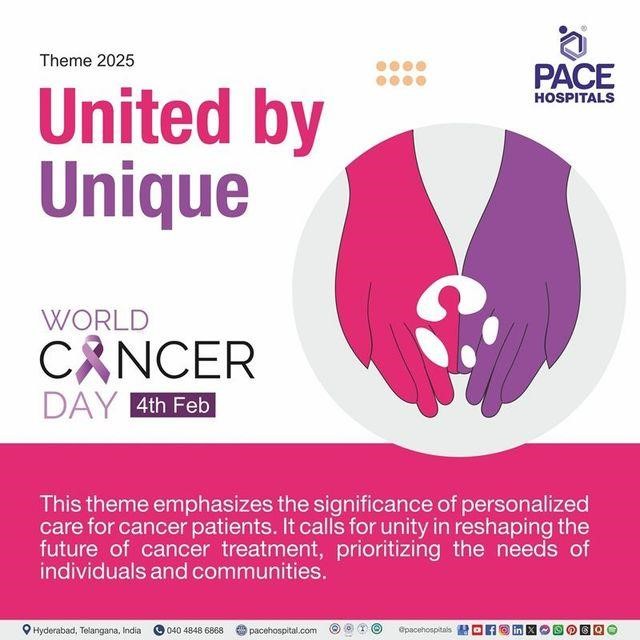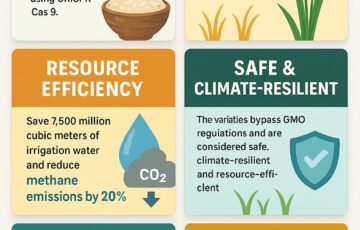World Cancer Day
Why in the news?
- World Cancer Day is observed on February 4th annually to raise awareness about cancer and encourage its prevention, detection, and treatment.
- In India, the day is significant due to the rising cancer burden, with predictions indicating cases may reach 2 million by 2040.
- The theme for World Cancer Day 2025-2027 is “United by Unique,” emphasizing the importance of placing individuals at the center of care and highlighting their stories in the conversation.
World Cancer Day
- Cancer can affect anyone, regardless of age or gender.
- Early detection and prevention are crucial for successful treatment.
- Timely screening, healthy lifestyle choices, and medical guidance can prevent or manage many cancers.
Key Facts About Common Cancers
- Breast Cancer
- Self-examinations and mammograms save lives.
- Early detection increases the chances of a complete cure.
- Lung Cancer
- Avoid smoking and limit exposure to harmful pollutants.
- Protecting your lungs today ensures a healthier future.
- Prostate Cancer
- Regular check-ups are essential for men over 50.
- Early intervention significantly improves treatment outcomes.
Cancer: A Lifestyle Disorder in the 21st Century
Rising Concern: Cancer incidence is increasing, raising concerns among the general public and healthcare providers.
Major Risk Factors
- Tobacco Use: Cigarette smoking, bidi, and paan masala contribute significantly to cancer worldwide.
- Alcohol Consumption
- Rising alcohol intake is a proven cancer risk.
- The US Surgeon General’s advisory states that even moderate consumption has cancer-causing effects.
- Oncologists emphasize that no amount of alcohol is safe.
- Obesity: Excess weight increases the risk of cardiovascular diseases and multiple cancers.
Prevention & Early Detection
Key preventive measures:
- Maintain a balanced diet and engage in regular exercise.
- Avoid tobacco and excessive alcohol
- Protect yourself from harmful UV rays.
- Manage stress to reduce cancer risk.
- Encourage loved ones to prioritize their health through preventive care.
Recognizing symptoms:
- Unexplained weight loss, fatigue, and persistent cough.
- Presence of unusual lumps or prolonged discomfort.
- Regular check-ups and cancer screenings are vital, especially for those with a family history of cancer.
Importance of Early Detection
- Timely screening and proper treatment can save lives.
- Medical advancements offer better treatment and improved survival rates.
- Modern treatment options have improved curability.
- Timely medical consultation enhances treatment outcomes.
- Delayed treatment can lead to complications.
- 30-50% of cancers are preventable through Regular screenings and vaccinations like the HPV vaccine.
Breaking Myths & Stigma
Changing Perceptions
- Society must change attitudes towards survivors; they are resilient, capable, and strong.
- Cancer patients can excel in demanding jobs and should not face discrimination.
- Cancer is not just a medical condition but is surrounded by fear and misconceptions.
- Stigma can prevent timely diagnosis and treatment, leading to worse outcomes.
- Cancer should be seen like any other treatable disease, such as diabetes or hypertension.
Cancer is NOT a Death Sentence
- Advancements in diagnosis and treatment have made many cancers treatable.
- Early detection significantly improves survival rates.
- Fear, denial, and misinformation delay crucial interventions, reducing the chances of recovery.
Changing the Narrative
- Educate yourself and others about cancer prevention, symptoms, and treatment.
- Encourage open discussions—cancer is a health challenge, not a taboo topic.
Support, Not Pity
- Kindness and understanding help patients cope better.
- A strong support system improves emotional and physical recovery.
- Let’s stand together to fight cancer with awareness, compassion, and courage.
What is Lymphoma?
Understanding Lymphoma
- Lymphoma is a type of blood cancer that originates in the lymph nodes.
- Lymph nodes act as filters to prevent infections.
- Lymphocytes (infection-fighting cells) become cancerous, leading to uncontrolled proliferation and lymph node swelling.
Types of Lymphoma
- B-cell Lymphomas: Hodgkin Lymphoma (HL), Non-Hodgkin Lymphoma (NHL)
- T-cell Lymphomas
Common Symptoms of Blood Cancer
- Easy fatigability and breathlessness.
- Generalized swelling of lymph nodes
- Unexplained weight loss.
- Bleeding, heavy periods.
- Recurrent, non-responsive fever, night sweats.
- Glandular swelling and bony pain.
- Some individuals may remain asymptomatic until advanced stages.
Diagnosis & Treatment
- Biopsy of lymph nodes and PET-CT scan confirm diagnosis.
- Chemotherapy (a combination of medicines) is the primary treatment.
- Timely treatment improves survival rates.
Importance of Awareness
- Lymphoma is often misdiagnosed as tubercular lymph node swelling.
- Early diagnosis and treatment are crucial to saving lives.
Call to Action
- Encourage open conversations about cancer to break stigma.
- Reduce stigma and create a world where cancer survivors are valued.
- Support patients and families facing cancer.
- Trust medical professionals and avoid misinformation.
- Educate, support, and empower those affected by cancer.
Coping with a Cancer Diagnosis
- A cancer diagnosis is stressful for both patients and their loved ones.
- However, it is also an opportunity for strength, growth, and resilience.
- Consult an Oncologist for:
- Accurate diagnosis through proper testing.
- Personalized treatment plans for better outcomes.
Source: The Indian Express
Mains question:
How can stigma and misinformation hinder cancer treatment and prevention efforts in India?(250 words)






